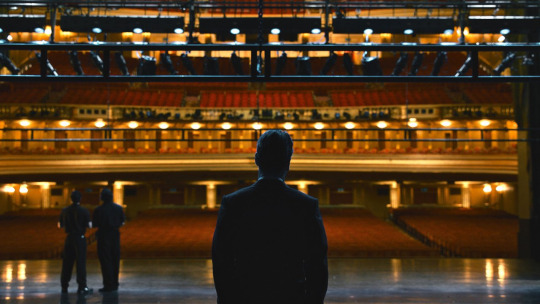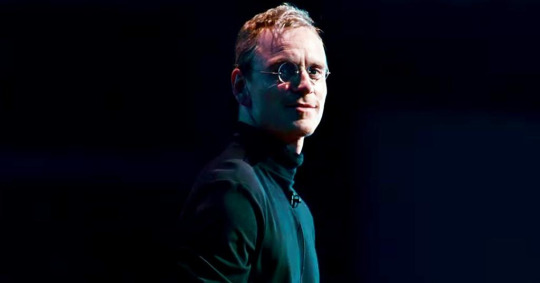Michael Fassbender doesn’t look anywhere near as much like the “real” Steve Jobs as Noah Wyle did in Pirates of Silicon Valley or Ashton Kutcher in Jobs. Aside from some gray hair and a pair of spectacles in the third act, he also makes no effort to bridge that likeness gap, nor does he really try to sound like Steve. This isn’t a criticism. In point of fact, it’s the second most freeing thing about Danny Boyle’s Steve Jobs. The first of course is Aaron Sorkin’s decision to structure the film around three forty minute sequences, each set years apart, unfolding in near real time surrounding three different product launches: the original Macintosh (1984), the NeXT (1988), and the iMac (1998). With a lead who doesn’t resemble the film’s subject and an outline that eschews a life’s worth of biopic tropes, this is a film that sometimes sets historical accuracy aside for emotional honesty, and that’s just fine. This is a movie. It’s not fucking real.
It does, however, feel real. Beyond the general artifice of Sorkin’s densely coiled snipe exchanges and the somewhat theatrical staging of the players, the overall tone of Steve Jobs will hit close to home if you’ve ever loved an asshole, or worked with one. Throughout the film’s triptych of sequences, we mark Jobs’ growth through his relationships with friends and co-workers: Kate Winslet as long suffering “work wife” Joanna Hoffman, Seth Rogen as Apple co-founder Steve Wozniak, Jeff Daniels as former Apple CEO John Sculley, and Michael Stuhlbarg as Andy Hertzfeld, a Mac team OG who serves as Steve’s punching bag. It’s a small cast, but no player (save for the underutilized John Ortiz as a GQ writer) feels wasted. Their real life standing with Jobs is altered and shifted somewhat for reasons that legitimately move the themes forward. For instance, Rogen’s portrayal of Woz is considerably more embattled than anyone has ever described the man himself, but that belly fire is necessary for the narrative’s central drama. Setting each act around the anticipatory fervor of a product launch would be gimmicky if it wasn’t such an apt metronome to set Sorkin’s discordant verbal music to. There’s a natural tension provided by the ticking clock that enhances every back and forth, every walk and talk, and every circular, self-aggrandizing speech. As Jobs himself muses at one point, it’s like every time there’s a product launch, everyone goes to a bar first to get drunk so they can tell him how they really feel.
It’s hard not to focus on the writing in a film this quotable, but director Danny Boyle avails himself nicely here, injecting his hyper-kinetic visual style into the proceedings in ways both subtle and overt, from smart compositions in the more intimate one-on-ones to fanciful bits of experimentation in the passage of time transitions from act to act. It’d have been easy to go the Birdman route with this material and shoot long take after long take, but the decision to heavily utilize editing (particularly some thrilling cross cutting in the second act) keeps the film from being suffocated by its own love of language. He might not have the control freak tendencies of a David Fincher, but Boyle more than capably helps tame Sorkin’s 178-page screenplay into a taut two hour run time.
No one should be surprised that a creative team of this pedigree has made the best film about Steve Jobs on a purely mechanical level; Pirates of Silicon Valley was a TV movie and Jobs is inarguably the worst film ever made by human hands, so the bar wasn’t set incredibly high to begin with. What may come as a shock is how challenging it is as an experience. Few figures in recent American history have been as lionized as Steve Jobs, and yet Aaron Sorkin, who has made a career out of writing cutesy, hypercommunicative geniuses, is the first one to really take the tech giant to task for, well, being kind of a shitty fucking person. Fassbender plays Jobs with a preternatural amount of charisma. He’s the human flesh equivalent of the iMac’s flashily colored casing, a closed-end machine that can’t quite connect with outside devices, but looks welcoming, and thusly, worthy of your time. On the page, however, Sorkin’s interpretation is unflinching. You like watching Jobs because Fassbender is such a compelling performer, but you sympathize with those around him because it’s such a damning portrait.
In one of the film’s carefully selected flashbacks, Jobs describes his vision of the perfect computer as being a bicycle for the mind, a piece of hardware that can enhance human efficiency. Sorkin’s take on why Jobs was so prickly is nearly as simple as The Social Network’s “I invented Facebook because a girl was mean to me” cop out, but it has decidedly deeper resonance. He writes Jobs as a broken cyborg, a self described “poorly made” person trying to create some measure of perfection to balance out how inelegant he considers his own existence to be. This is traced back to his being adopted and feeling like a baby that someone laid eyes on and rejected. It’s the crooked throughline that allows him to deny paternity for his own daughter Lisa, the single dramatic strand of the film that is guaranteed to elicit the most pathos. That tragic backstory is never treated as an excuse for any of his behavior, but rather a narratively satisfying explanation. Jobs is presented as an Ain’t Shit dude who knows he Ain’t Shit and has divorced himself from this fact to focus on making things for people that he feels could better their lives far better than he himself ever could.
My father left my mother right after I was born, so the notion of feeling like a baby someone looked at and returned to the store is not unfamiliar to me. Like Sorkin’s Jobs, it’s a persistent itch forever nagging at the back of my mind, one that when compulsively scratched, has never inspired my best decision making. It’s been in the DNA of many a bad decision in my time on Earth, so as the film went on, it became less difficult for me to forgive Steve, or at the very least empathize with him. Sorkin clearly empathizes with Jobs’ perceived predicament on some level, the struggle to, as Woz puts it, be decent and gifted at the same time. Jobs’ machines are like Sorkin’s scripts, beautifully crafted objects designed to be apology pieces from creators who’ve long since reconciled a deep failing within their core programming. His authorial voice is uniquely suited to speak on this particular mindset, as The Social Network proved so well. His tics and quirks are easier to swallow when asking you to relate to the flawed heroes of his film work than to rebel against his straw man villains of his TV oeuvre.
How much you want to see the thrilling story of a rich white dude slowly learning to be slightly less of an asshole depends on your personal admiration of or abhorrence for troubled geniuses but, given the popularity of the Iron Man films, there’s probably a lot more of the former than the latter out there. Maybe we’re obsessed with humanizing these captains of industry so we feel less bad about spending so much money on their products, or maybe we all long to wear black turtlenecks and create insanely great things that extend beyond our personal limitations. The best thing Steve Jobs has going for it is its low arc for change. The film never manufactures a leap of maturation in Jobs, rather it leverages Fassbender’s innate likability and subtle acting choices to imply the kind of realistic growth you might actually witness in real life. There’s no truly triumphant moment where he becomes the perfect version of himself. He remains a flawed figure, but one we feel closer to than when the film began. That’s about the most you can really hope from a biopic.
Steve Jobs is now playing in select theaters. It opens nationwide on October 23rd.



